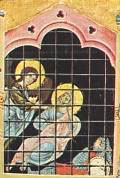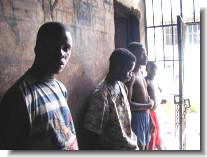|
 |
Program: Free the Prisoners |
 |
|
|
|
 Prison visits Prison visits
Visits are usually on a weekly basis and are the expression of an on-going personal relationship, trying to involve as many inmates as possible. In some prisons, the Community knows every inmate.
A visit is the first and most important act of friendship, allowing us to learn about any violations of human rights as well as find out prisoners’ most pressing needs.
Contact with families
The Community strives to establish contact between the inmates and their families. This may in some cases turn into a full-blown research project, as many inmates are held in prisons located far from where their relatives live.
News is exchanged and visits from partners facilitated. Re-establishing family ties is particularly important in the case of imprisoned minors.
|
|
|
Legal assistance
This consists of a series of actions aimed at assisting detainees awaiting trial, extending from tracing down their files – which are often kept in the arresting police precinct – to paying fees for lawyers, without whom a proper trial procedure cannot get under way.
Cases are frequent of detainees who, for reasons connected with poverty, are simply “forgotten” in prison, perhaps for years after they have served out their sentences, because they lack legal defense. Hundreds of these cases have been resolved thanks to the Community’s intervention.
Basic education, schooling and professional training
Primary school-level courses in elementary education as well as professional training courses are organised in prisons, helping rehabilitate inmates into society at the end of their term. Primary school courses are crucial for imprisoned minors. Once schooling is over, exams leading to the awarding of graduation certificates can be sat. In Kenya’s Nakuru prison, and in the prison of Bukavu, in the Democratic Republic of Congo, adolescents are involved in the activities of the peace schools.
Many imprisoned young people may be eligible for a scholarship paid by adopt a child from afar, which will enable them to carry on with their studies.
In Mozambique’s prisons, various types of professional training courses are carried out; these range from cutting and sewing (for making small articles from material, such as purses and bags), to wickerwork (making baskets and bags etc.), carpet-making and fabric weaving. A course in cabinet-making is in the pipeline, to be led by a master craftsman who will instruct inmates first-hand.
There are courses for shoemakers, carpenters, for zinc and terracotta workers. In Lichinga Prison (northern Mozambique) a professional training course for bakers has been set up. A 250-euro contribution allowed a wood oven to be constructed in the prison’s courtyard; it now turns out 400 rolls a day, which are sold beyond the prison walls. Once a week, however, the 200 Lichinga inmates are each given one freshly-baked loaf.
 Food aid Food aid
Food shortages, shortages of healthy food and clean water, represent an extra punishment, a double helping of injustice. Food is in fact the first right that needs to be met, a basic necessity for survival. In almost every prison there is just one meal per day: a plate of mealie meal, and if the family is far away, or too poor to bring extra rations, there is the risk of becoming seriously undernourished. Currently, the distribution of dietary supplements by the Community is reaching several thousands of prisoners.
On 25 December, in many of the prisons where the Community has its service, a Christmas dinner is organised, creating the spirit of one great family without bounds. For many inmates, the Dinner is the only real square meal of the year, and so it’s a specially festive occasion, often involving prison staff as well.
Medical support
Prison life entails serious health risks. Malnutrition leads to enervation, predisposing inmates to many forms of illness. But the lack of space, too, sleeping on the ground, the shortage of water and of basic hygiene: all these factors encourage the spread of serious diseases.
The Community provides for the distribution of basic first aid medication and of materials for personal hygiene, soap especially, but toothbrushes, mosquito nets, clean linen, clothing, mats or mattresses and water-purification filters are also supplied.
In some prisons volunteer doctors ensure dermatological and gynaecological check-ups for pregnant women and AIDS tests under the DREAM programme. Re-training courses for prison nursing staff are also organised.
Structural interventions
The Community intercedes to help better the health condition of prisoners through structural projects.
In Mozambique’s Lichinga and Cuamba prisons two “postos de saùde” or small-scale healthcare centres have been built with a capacity to accommodate 17 bed-patients. 12 latrines have also been renovated and had their plumbing systems renewed. In Beira Jail, an already existing “posto de saùde” or healthcare centre has been renovated and new cells have been constructed Approval is expected soon for a European Union project to connect the prison to the city’s mains water and waste systems.
In Cameroon’s Tchollirè prison a new well for water has been dug, as the old one was practically exhausted: the round 100 inmates and members of the surrounding population had been left without drinking water.
Prayer and catechesis
Even for a prison inmate, it is possible to believe and hope that humankind will one day find a way to live in peace and reconciliation. To those who so desire, the Community offers a chance in many prisons to share a moment of prayer, to read the Gospel and join in Catechesis. Prayer meetings are held with and for the sick, for loved ones, and to remember those whose sufferings are greatest, such as those on death row or those who have been affected by misfortune, by war, hunger or poverty.
There is a need and a desire for “goodness” inside every inmate – if elicited and nurtured. It is often hidden by experiences of violence and rage. Communicating the Gospel means giving hope and a future to those without; means offering forgiveness and love.
Freeing the prisoners
 There are many prisoners who, even though they have served out their sentences in prison, are not able to return home because they cannot pay the fee required for their release. Many African countries, in fact, employ dual punishments for crime comprising a custodial and a financial part. To qualify for release from prison the detainee must pay a sum of money to cover the reimbursement of legal expenses. There are many prisoners who, even though they have served out their sentences in prison, are not able to return home because they cannot pay the fee required for their release. Many African countries, in fact, employ dual punishments for crime comprising a custodial and a financial part. To qualify for release from prison the detainee must pay a sum of money to cover the reimbursement of legal expenses.
The Community assists these prisoners return to their homes, helping them find the funds needed to effect release procedures.
There are also many detainees who stay on remand awaiting trial for periods longer than would be imposed even by a guilty verdict, simply because they cannot find the money to pay their legal fees.
The Community helps these detainees, paying a lawyer who spares no efforts in ensuring that their case comes before a judge as swiftly as possible.
In Guinea Conakry, around 100 minors have been released from prison and returned to their families thanks to the Community’s interventions. |
|
|
|
|
|